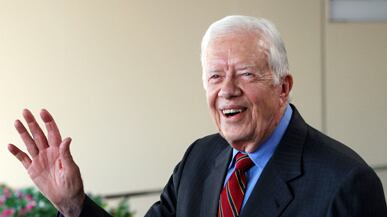President Jimmy Carter is making the rounds again—part of the now yearly ritual of book publication for America’s most prolific former president. But this time, Carter has left behind the Christmas encomiums, Revolutionary-era fiction, and Middle East entanglements for a day-by-day account of his time in the West Wing. Carter’s White House Diary isn’t the only work dredging up memories of cardigans, stagflation, and endless lines at the pump. Next month, Carter’s vice president, Walter Mondale, will release his own memories between hard covers under the title, The Good Fight: A Life in Liberal Politics.
With his new book, Jimmy Carter is trying to rehabilitate the reputation of his administration. In his brisk media tour, the soon-to-be 86-year-old Carter has charmed the media with his swipes at Delaware Senate candidate Christine O’Donnell (the man who famously copped to lusting in his heart dislikes her opposition to masturbation). He’s also raised hackles with his claim that he’s the best former president we’ve got out there. But beyond the headlines, Carter’s reappearance poses a particular problem for this White House, as they are forced to entertain another round of speculation over how much the troubles of the Obama administration mirror those of the last one-term Democratic president. The Wall Street Journal diagnosed the trend on Wednesday: “ The Carter-Obama Comparisons Grow.”
So how accurate are those comparisons?
Veterans of the Carter administration say that the presidents shared similar profiles when running for office. For one thing, while Obama’s race was a central topic of the 2008 election—the election of an African-American to the White House was supposed to signal great progress for the United States—it’s easy to forget that Carter overcame a hurdle of his own. Not since the Civil War had a white Southerner been voted into the Oval Office. So too did both candidates carry the mantle of outsiders into Washington: Carter came to the capital with his Georgia mafia, set on returning virtue to the country; Obama arrived with an anti-establishment story of his own, one that captured his complicated roots and his courage for taking on the mighty Clintons.
“Carter and Obama did indeed come from the far fringes of the American establishment,” Carter speechwriter Jerry Doolittle says.
That both Carter and Obama were less familiar to the American public posed a similar dilemma. It allowed hopes to ride high.
“They were both elected with expectations of hope,” says Carter pollster Patrick Caddell, who has become a critic of the Obama administration. “Voters invested a very great deal in two men that they didn’t know much about. It creates a problem of disappointment, with people’s expectations so high.”

“Here’s the problem,” Caddell says, “when you are not well known, voters feel fooled. You can be Richard Nixon or Bill Clinton. Voters will say, ‘I know what we are getting here.’”
Carter and Obama have a shared sense of how to structure their presidencies, says Carter’s chief domestic adviser Stuart Eizenstat.
“Voters invested a very great deal in two men that they didn’t know much about. It creates a problem of disappointment.”
“Both are more intellectually oriented presidents,” Eizenstat says. “They are both very analytical presidents who put more emphasis on the development of ideas and a vision of solving long term problems—for Carter, energy; for Obama, health care—than on the politics of selling their ideas to the public.” (Although, Eizenstat admits that Obama is better equipped to do that selling. “Obama is more subtle, more capable of adapting to change,” he says.)
In a number of significant ways, Obama and Carter are mirror opposites. Take their ideological approaches to domestic and international affairs. Carter was a conservative, at least compared to his party, when it came to domestic politics, but he brought a liberal approach to international affairs, focusing on human rights and avoiding the use of force, Eizenstat says. Obama has reversed this approach—more in line with the traditional liberal wing of his party on domestic affairs, while bringing a muscular, conservative approach to foreign policy, prosecuting two wars and continuing the Bush administration’s anti-terror policies.
Moreover, when it comes to governing, the Obama administration has taken a completely different approach. Carter was criticized for overlooking Congress. Obama has been knocked for paying the other end of Pennsylvania Avenue too much deference.
Or as Doolittle sees it: “Carter was berated at the time for not paying enough attention to Congress and not clearing things with Congress, not massaging Congress. Obama is criticized in the exact opposite direction for having tossed everything to Mitch McConnell.”
And of course Obama and Carter’s different relationships with Congress underscore their fundamentally different paths to office. Obama may have hurried through his time in Congress but he certainly brought a knowledge of its practices—as well as some of its most outsize figures like Rahm Emanuel and Joe Biden—into the White House. Carter surrounded himself with advisers from his time as governor in Georgia.
With his new book, Jimmy Carter is trying to rewrite history’s dim view of his administration. He’s said that were the Iran hostage crisis solved and had Ted Kennedy not been such a trouble maker, he would have secured a second term. It’s a good reminder of how events define a president, rather than the other way around. Carter veterans are quick to point out that the world that greeted Obama’s presidency was far more treacherous than the one that welcomed Carter. While the economic outlook during Carter’s time was rough, it was a far cry from the one that Obama confronts. Plus, Carter didn’t have to struggle with two major wars as Obama has.
“This is orders of magnitude worse,” Doolittle says.
Eizenstat sees another fundamental difference in the events that have defined the administrations. The low ebb for Carter wasn’t the midterm election of 1978—the Democrats lost only 11 seats—but the final days of 1980, as the Iran hostage crisis perplexed the administration. Democratic supporters, economists and historians among them, believe that Obama’s darkest days are happening now. The economy’s recovery could coincide with his re-election campaign, saving him from Carter’s fate.
Carter’s failure to win a second term has haunted Democratic politics. It surely frightens those in Obama’s circle as the White House barrels toward the midterm elections with a presidential campaign over the horizon. Yet Carter administration veterans say that his White House experience offers the current president important lessons.
“They should be blessed to learn from it, not run from it,” Caddell says.
This story has been updated from its original version.
Samuel P. Jacobs is a staff reporter at The Daily Beast. He has also written for The Boston Globe, The New York Observer, and The New Republic Online.






